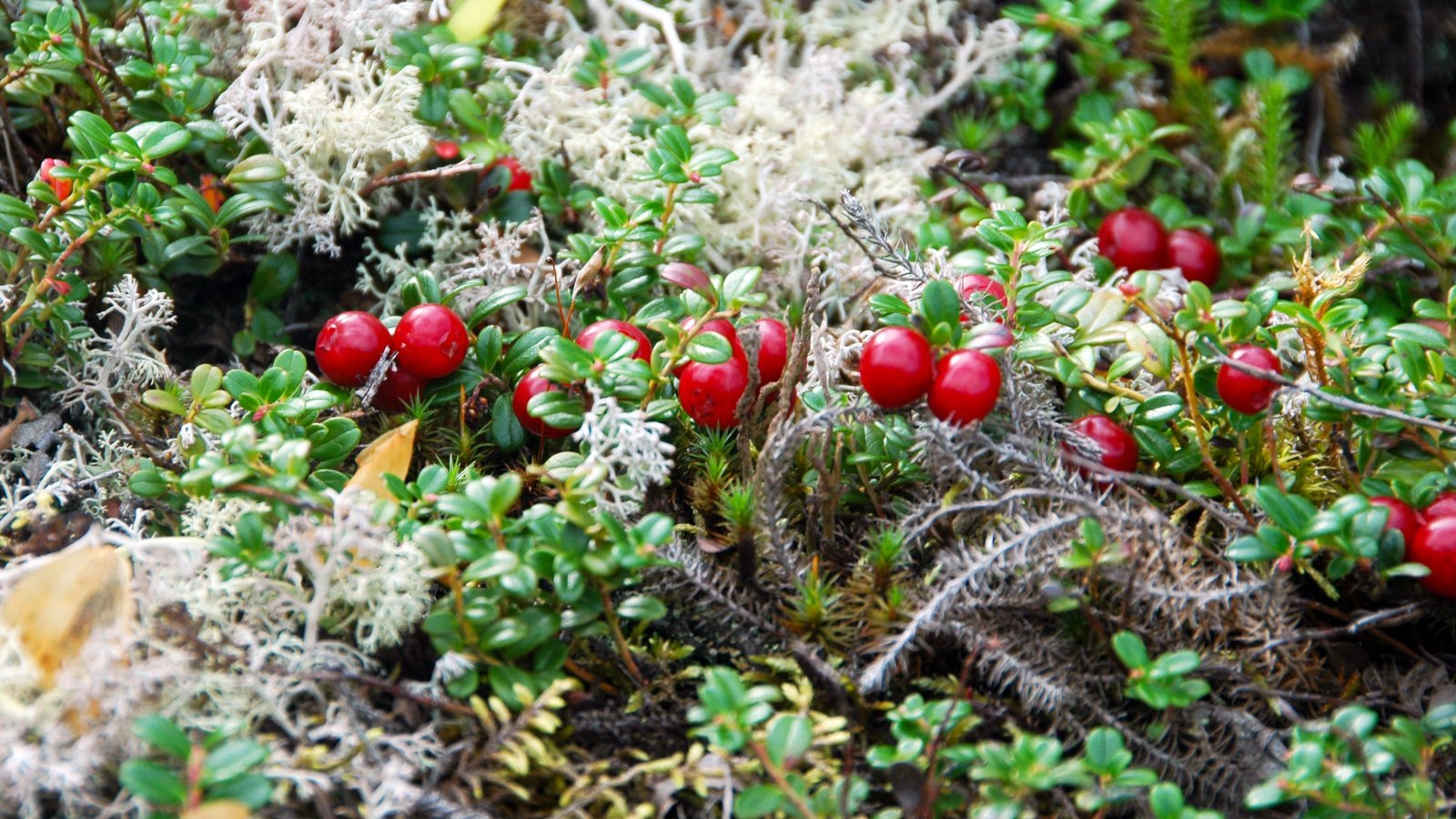Many of the vegetation I write about favor full picture voltaic. Nonetheless what about these of us with shady areas? There should be one issue obtainable in the marketplace for us, right?
Out of doors the mannequin new dwelling I’m growing with my affiliate, we now have some attractive rock retaining partitions which are all through the shade quite a few the day. I’ve targets of lush trailing greens and flowering vines hanging over the rocks. I’ve been in the hunt for the proper flooring cowl for the rocky soil in our native local weather.
In that mild, please get pleasure from this tips of 17 attractive flooring covers for shady areas I’ve researched so that you just simply don’t should. Profit from!
Why Should You Cowl the Flooring In Your Yard?
I assume you’ve heard that mulching might also help the soil retain moisture, suppress weeds, protect soil in place, and stop erosion. Efficiently, defending the underside spherical a shade yard is not any totally fully completely different! Grass creeps in quick and is troublesome to eradicate, so when beginning a shade yard, we advocate killing as soon as extra any grass all through the home and beginning with a transparent slate.
Some vegetation don’t concepts being stepped on, making a incredible inexperienced path, whereas others do accurately beneath patios and alongside rock partitions. Listed beneath are 17 of our favourite flooring covers that work accurately in shady areas.
Golden Japanese Stonecrop
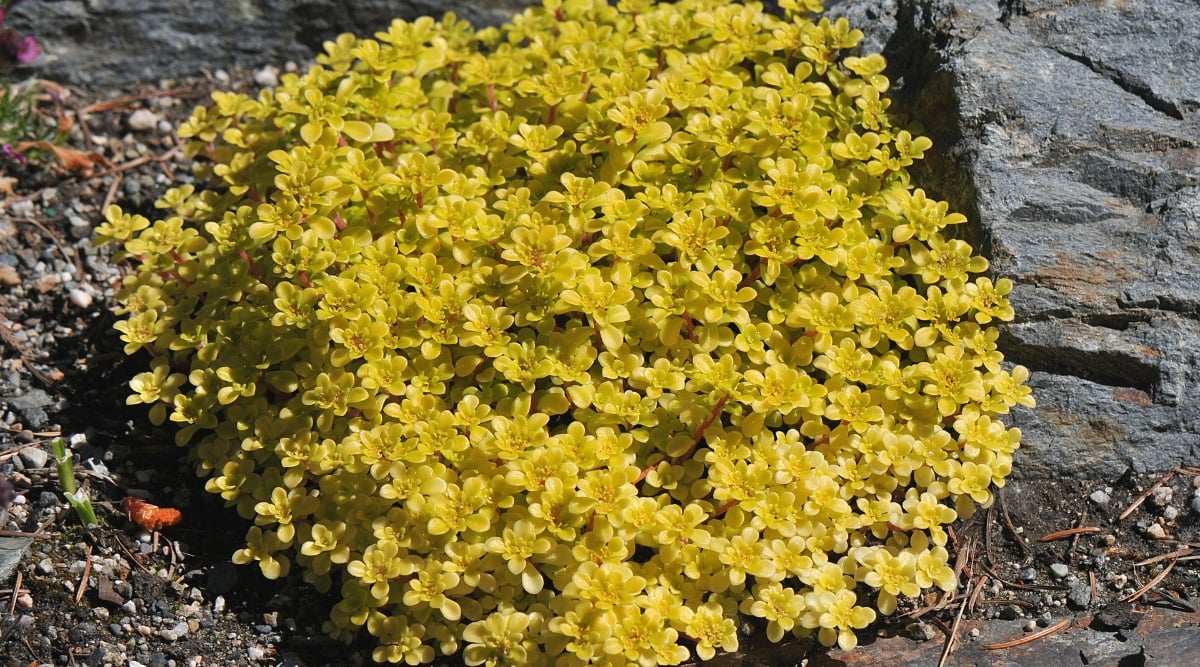

Whereas most sedums require full picture voltaic to partial shade, ‘Ogon’ can tolerate full shade. Grown principally for its vivid gold greenery, it furthermore blooms throughout the summertime with a yellow flower. Inside the autumn, the foliage transitions to a deep reddish-purple.
This distinctive sedum grows low to the underside, virtually three inches tall, forming a dense mat-like cowl. It’s good for a shady rock yard, spherical raised beds, or beneath a patio.
So far as upkeep, Golden Japanese Stonecrop gained’t ask fairly a bit from you. It prefers the soil to stay pretty moist nonetheless may even be warmth and drought-tolerant as shortly as well-established.
Bunchberry
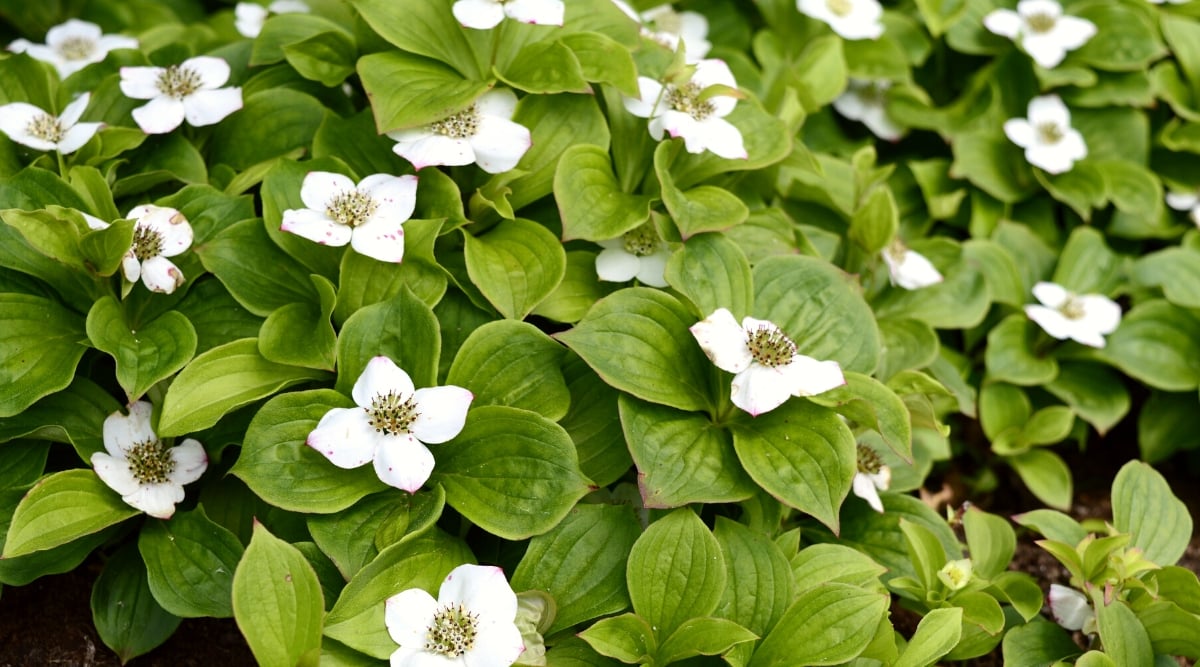

In case you develop in a colder house, you’ll often truly actually really feel restricted by your picks for chilly, persistently moist soils. Enter bunchberry, which can be discovered rising even in Alaska. Acknowledged often as creeping dogwood, dwarf dogwood, bunchberry dogwood, and Canadian bunchberry, this plant makes a attractive, medium-green flowering carpet.
In late spring or early summer season season, it blooms a cartoon-like white flower that options 4 pointed petals with a salt and pepper heart, nonetheless don’t anticipate flowers till at the very least the third 12 months. In late summer season season, the blossoms selection tiny fruits that carry out meals for birds.
Bunchberry spreads by underground rhizomes so it expands pretty merely, nonetheless shouldn’t be planted in a excessive foot web page company home.
Creeping thyme
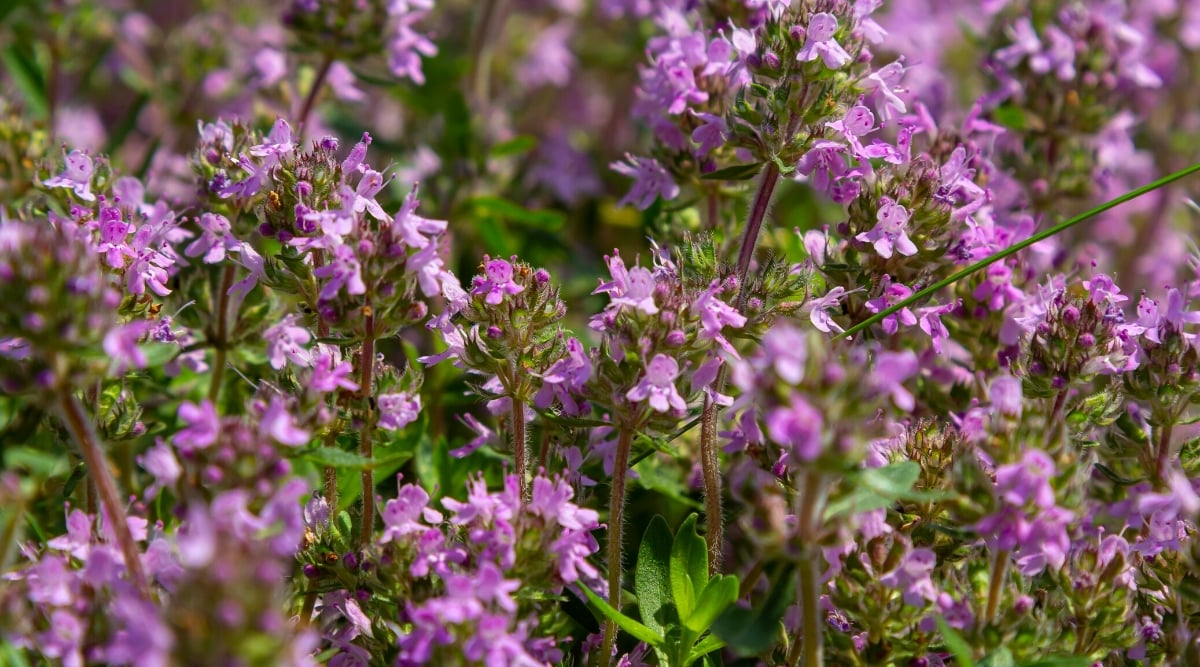

A flooring cowl that doubles as an edible herb and smells incredible? Constructive, please! Creeping thyme is a incredible darkish inexperienced and, when it blooms throughout the summertime, is roofed with small white, pink, or purple flowers.
It’s hardy in zones 4-10, making it an unbelievable alternative for many growers. Pollinators desire it, so watch out the place you step all through the yard. Creeping thyme grows very densely, and subsequently, it’s good for weed suppression. It may furthermore creep by rocks, retaining partitions, fences, or pathways, making the title ‘creeping thyme’ very acceptable.
Wild Ginger
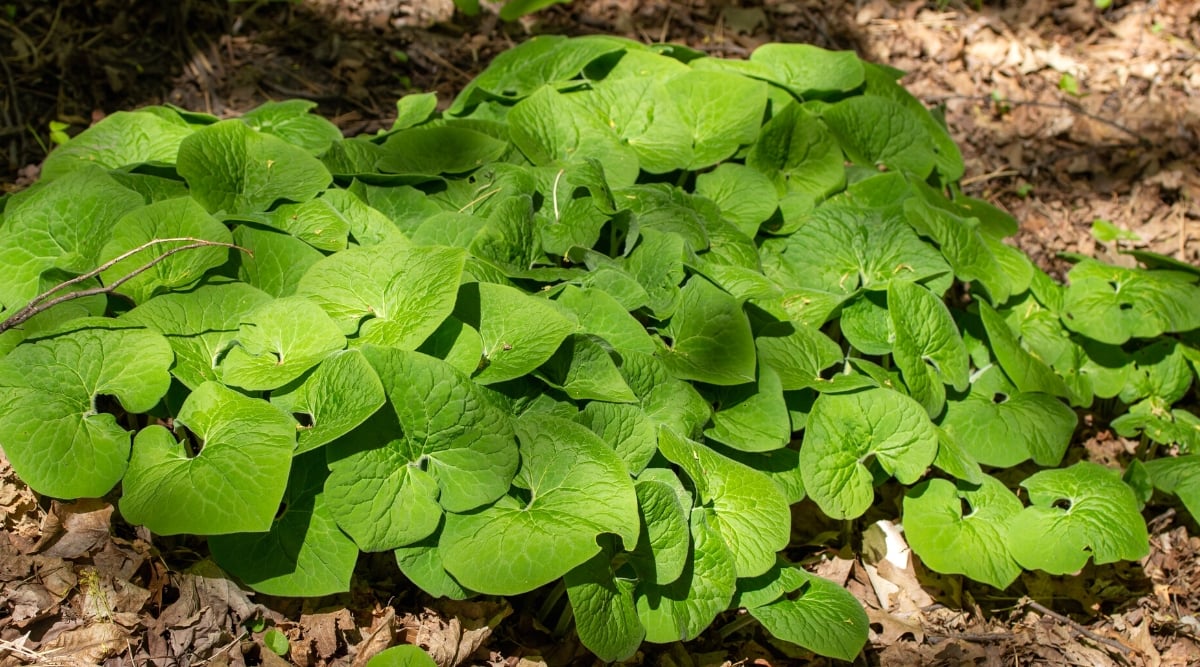

An underrated, dependable, and fascinating flooring cowl, wild ginger serves as a meals present for the Pipevine Swallowtail butterfly. Hardier and better than its cousin, European ginger, it survives winters all one of the best ways proper right down to zone 3. Its shiny leaves are large, darkish inexperienced, and heart-shaped. You may by no means see the pendulous flowers that keep beneath the foliage. These are pollinated by crawling bugs.
On account of it’s a woodland plant, it requires moist, well-draining soil that’s wealthy in pure matter. It thrives in full shade. Though it has a gingery fashion and aroma, wild ginger shouldn’t be for consumption and is of a plant household fully totally fully completely different from the culinary model (Zingiber officinale).
Give wild ginger 1-2 toes of house when planting. The plant spreads by means of rhizome, making a dense carpet of foliage. Use it to fill in house shut by and between early spring bloomers. Divide vegetation all through the spring for the proper success in transplanting and getting them established. It is vital to be able to take movement by means of the rhizomes, which develop barely beneath the soil flooring.
Seen Ineffective Nettle
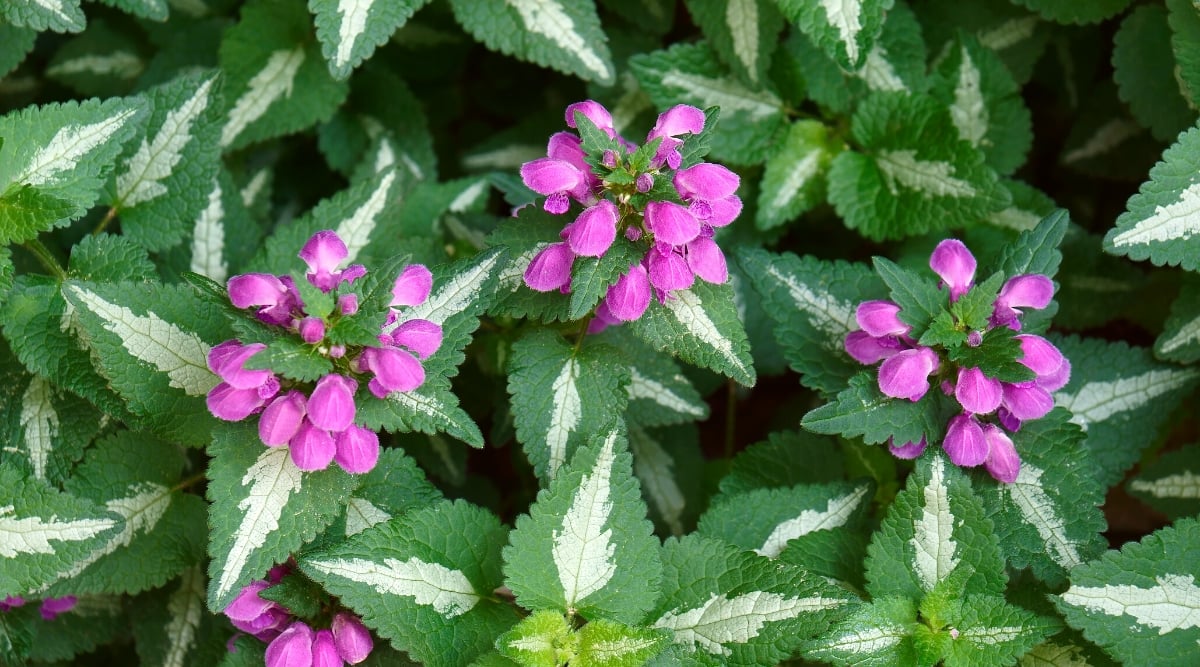

Though this member of the mint household seems to be similar to stinging nettle, it gained’t damage you, subsequently the ‘ineffective’ half in its title. Nonetheless the hair on its oppositely organized leaves could make you do a double take. It blooms in spring and summer season season with small white, pink, or purple flowers, and with the flowers come the bumblebees. Whereas the blooms are partaking, it’s typically grown for its lush foliage.
When planted in full shade, seen nettle, on account of it’s often often known as, gained’t require fairly a bit for watering. Though some growers are scared off by its expertise to unfold, seen nettle is an unbelievable likelihood for large, shady areas that want security, identical to newly constructed beds.
Expert tip: Develop this alongside Candy Woodruff, one completely different groundcover on this tips, for a novel underplanting.
Creeping Phlox
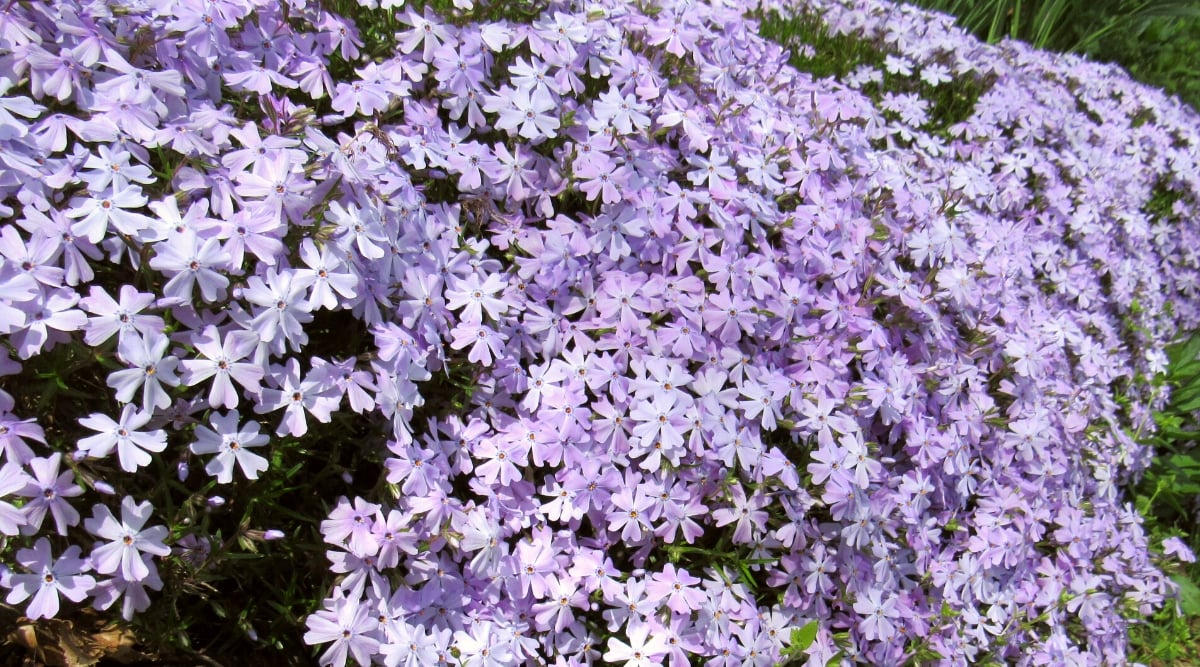

You may consider upright flowering phlox, nonetheless have you ever ever ever heard of low-growing creeping phlox? Its pretty pale-hued flowers make it fairly the sight when rising in mass alongside border partitions, retaining partitions, and rolling sloped land.
Creeping phlox may even be often known as moss phlox and might get its botanical title for its enchancment by means of stolon, or horizontal runners. These enable it to unfold, giving it a creeping nature. The darkish inexperienced oval leaves look superior even after the flowers have handed. Pruning is optionally accessible, nonetheless it’d in all probability shield the world wanting cleaner if spent flowers are eradicated.
Scale back weed stress when establishing creeping phlox as a flooring cowl and make sure the soil stays moist. Feed with a well-balanced and pure fertilizer all through the spring.
Creeping Jenny
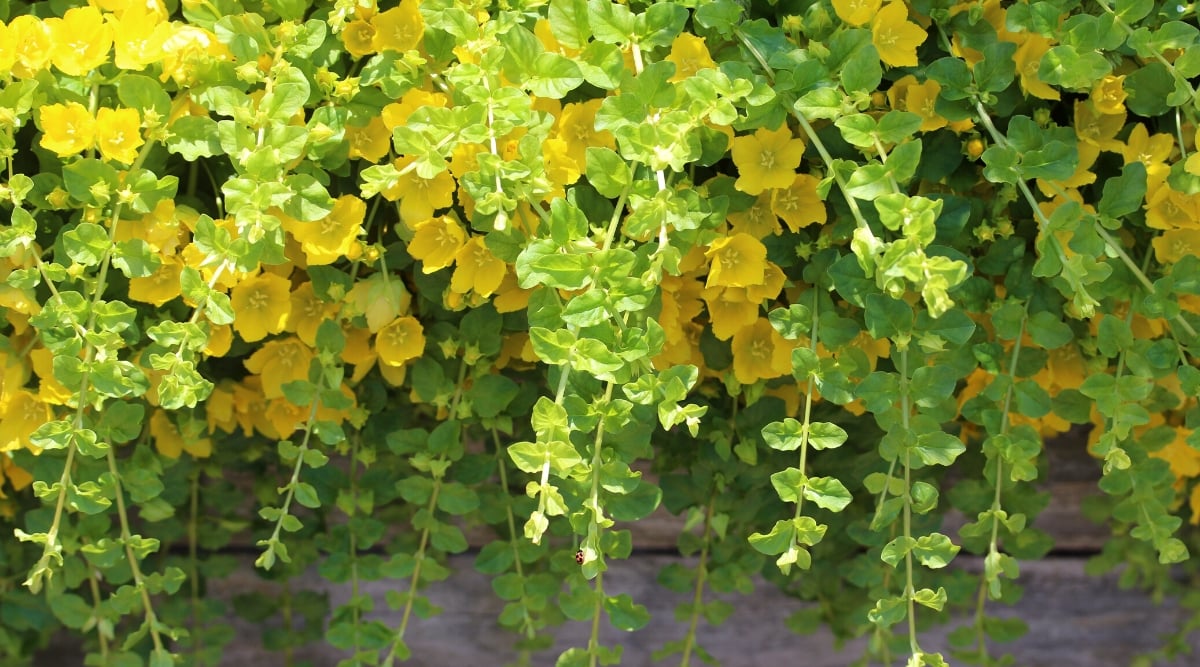

Grown principally for its pretty foliage, Creeping Jenny is a low-growing cowl whose leaves resemble little cash, incomes it the nickname moneywort. The small yellow, lantern-shaped flowers don’t final extended nonetheless are fairly cute.
As a consequence of its unimaginable enchancment value and experience to unfold, planting Creeping Jenny close to annual gardens isn’t immediate. Nonetheless, it covers ugly flooring areas identical to a as soon as extra deck or spherical a storage or yard shed very accurately. Be careful for slugs, caterpillars, and aphids.
Jenny’s not categorical regarding the soil pH diploma nonetheless does want it to be well-draining. When you could develop Creeping Jenny in full picture voltaic, the leaves are sometimes additional yellow and usually flip into blanched. When grown with restricted picture voltaic, they proceed to be a waxy, medium inexperienced.
Pansy
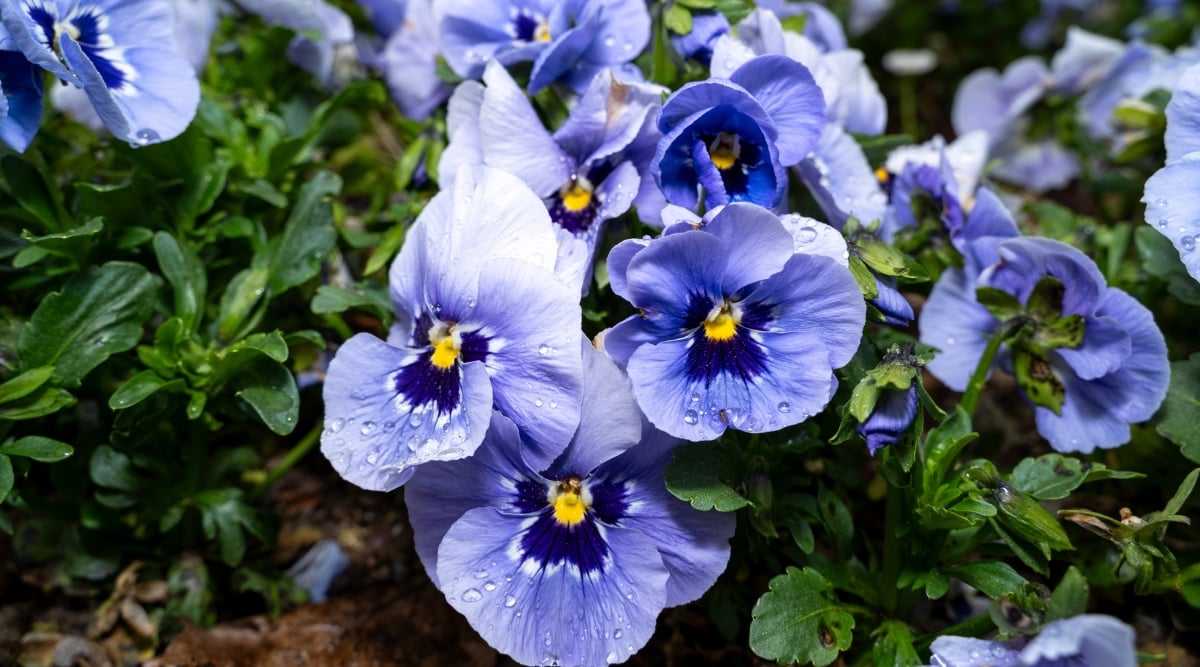

This one would possibly shock you, nonetheless pansies do accurately in shady areas and are tremendous cold-tolerant, making them a wonderful groundcover likelihood. Their foliage furthermore stays low to the underside and appears good after they bloom all through the spring and early summer season season. These members of the viola household readily reseed, making them straightforward to deal with.
Pansies had been bred from violas, and there are numerous totally fully completely different flower sorts and coloration choices to choose from. Probably one in all many crucial fashionable is ‘Johnny jump-ups’, which appear to be a satisfying purple, yellow, and white “face”.
Try winter sowing them for the earliest spring blooms. Pinch as soon as extra dried-up flowers to encourage new enchancment. As a bonus, the flowers are edible.
Bearberry
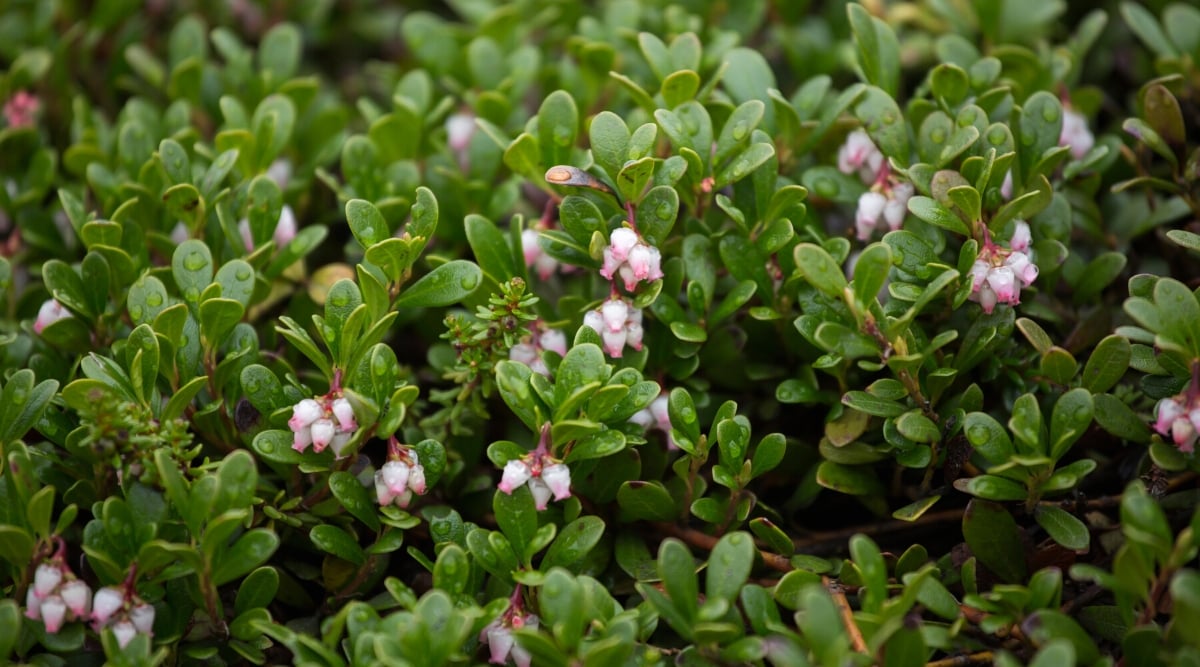

This distinctive sub-shrub kinds a dense flooring cowl or trailing cowl for a wall. Its foliage is rounded, darkish inexperienced, and shiny, which transitions to a bronzed purple all through the low season. The plant consists of branching twigs and extended, versatile stems and selections alternating leaves. Small pink flowers bloom from Would possibly to June, akin to small lanterns, merely ¼ – ½ inch.
This partaking and hardy groundcover thrives in sandy soils, rock partitions, and dry and rocky spots. It spreads pretty slowly by shallow rhizomes and doesn’t do accurately when moved as shortly as established. Decide a spot you’re optimistic of, the place it’d almost certainly unfold over the next few years. Use a balanced fertilizer every spring to encourage new enchancment. Administration weeds for many fascinating outcomes.
Bearberries will play a essential place in any yard ecosystem. Whereas the plant itself is pretty deer-resistant, the small pink berries are a essential meals present for native birds and small critters, too. A variety of butterflies make Bearberry shrubs their dwelling. Good for chilly house growers, Bearberry is a extraordinarily cold-tolerant likelihood.
Wild Strawberry
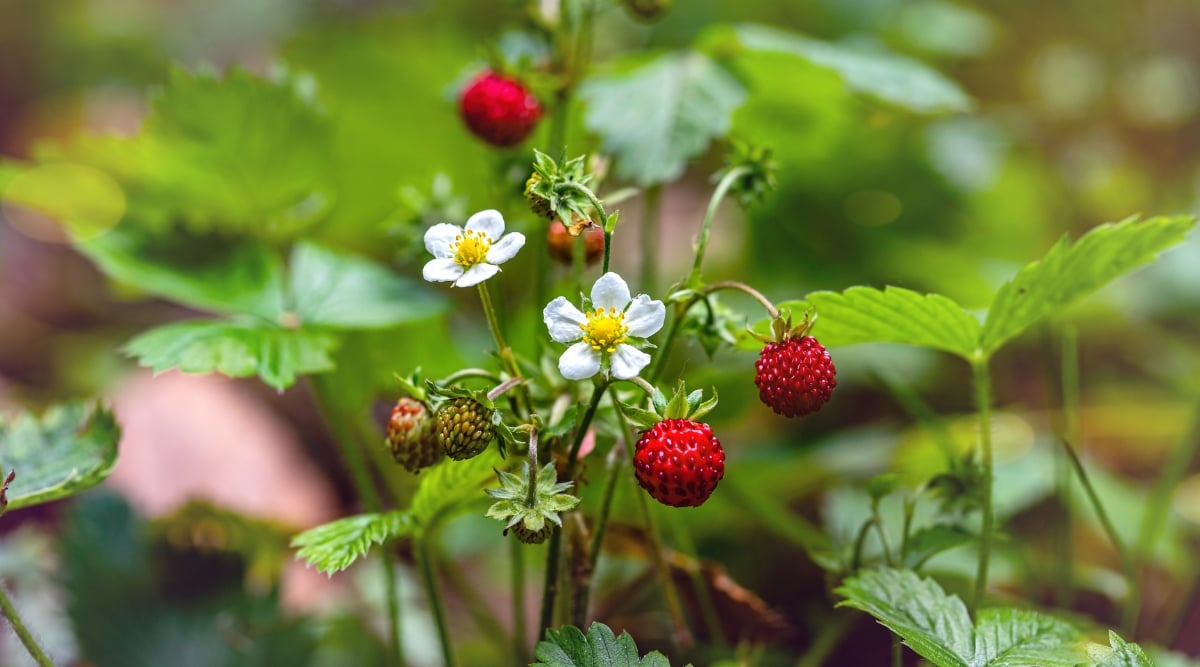

Probably you’d like a reasonably flooring cowl that’s edible, too? Wild Strawberry spreads merely in shady beds, defending the underside with bright-green rosettes. In late spring to early summer season season, it produces lovable white flowers adopted by candy, scarlet berries.
Wild Strawberry can go dormant all through the midsummer warmth, so keep away from it in arid, desert climates and shield it in full shade in areas with scorching summers to stop leaf scorch.
Whereas disease-resistant, powdery mildew can flip into an occasional draw back. Wild Strawberry kinds colonies by means of runners, and is simple to transplant wherever your yard wishes some coloration.
White Clover
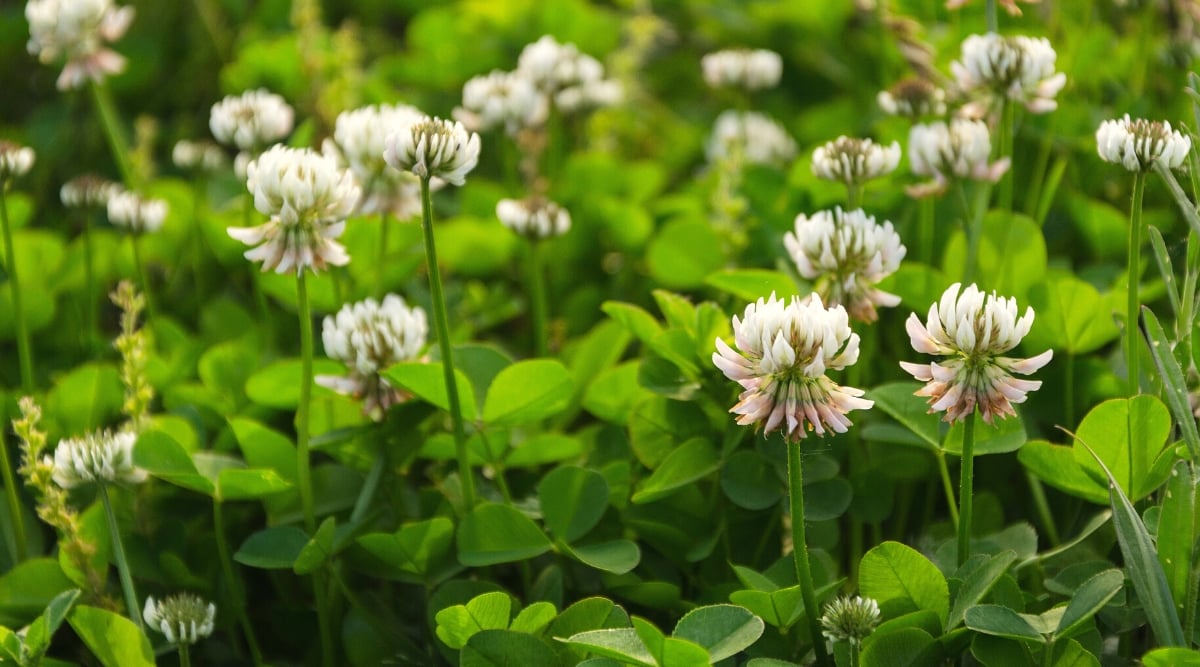

This spreading clover is simple to seek out out, thrives in shade, and can tolerate heavy foot web page company, making it an unbelievable likelihood for a shady rock yard or alongside a north-facing patio. It furthermore attracts helpful bugs, making it an environmentally good yard fully completely different that stops erosion. And sure, it’s the an similar white clover that pops up typically in your yard!
White clover serves accurately as a residing mulch that suppresses weeds in perennial fruit bushes and vegetable gardens. Michigan blueberry growers uncover rising white clover between rows of vegetation will improve pollination. It may very well be mowed, making it straightforward to deal with, and produces additional nitrogen than most fully completely different legumes. Seeding could also be merely adjusted to no matter scale yard you’ll have.
This flooring cowl can tolerate moist situations, dry spells, and pretty acidic soils. We planted this alongside a sloped retaining rock wall home behind our home. It may deal with canine foot web page company accurately, too.
Woodland Stonecrop
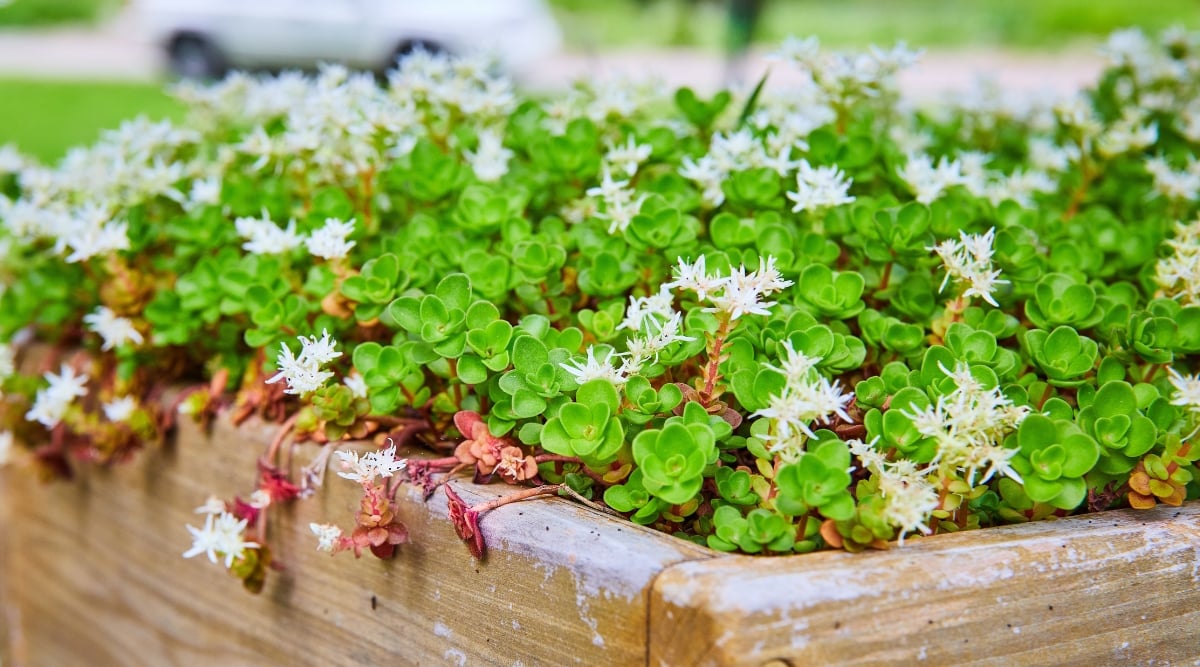

Furthermore known as wild stonecrop, this sedum blooms from March to June, relying in your house. Its flower is a small white one with pointy petals. What makes wild stonecrop totally fully completely different from fully completely different sedums is that it’d almost certainly tolerate moisture and shade bigger than others.
The North American native kinds a dense, trailing mat with its succulent foliage. It may fortunately creep alongside rocks and in between cracks and crevices.
Propagate by ranging from seed, dividing, or taking cuttings from healthful vegetation. Cuttings could also be taken at any stage all through the season and provide a straightforward option to create new sedum vegetation.
Candy Woodruff
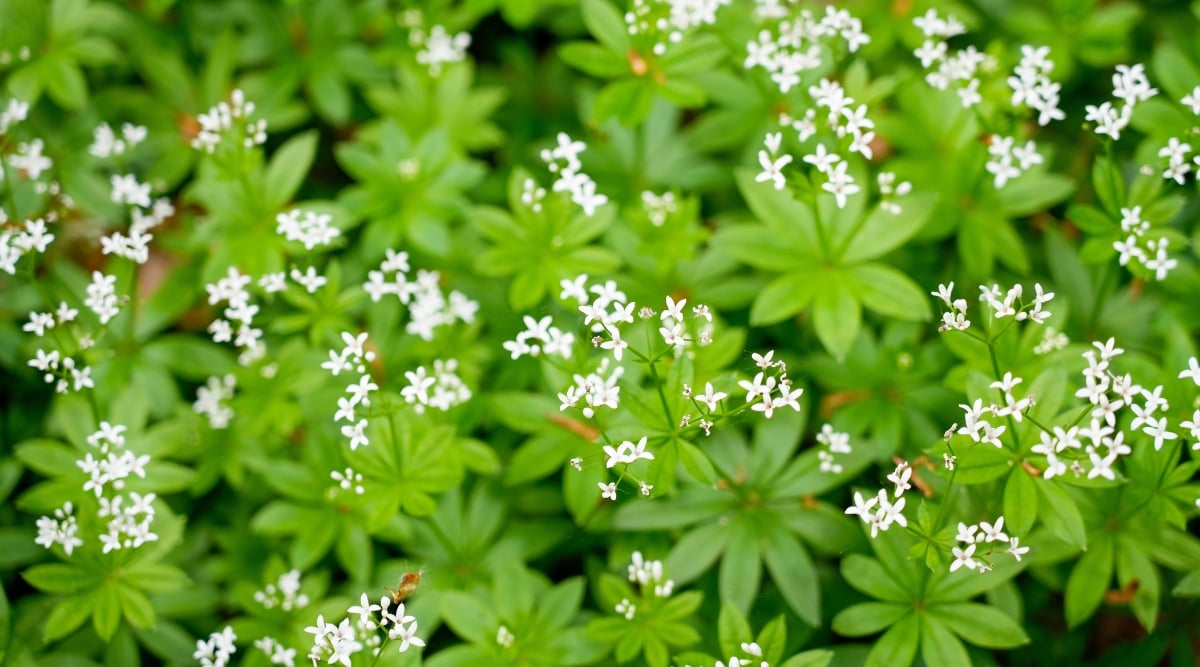

This herbaceous perennial blooms cute little white, 4-petaled star-shaped flowers with medium-dark inexperienced leaves. It’s a very simple groundcover to develop, and it’s deer and rabbit-resistant in addition to.
Frequent names for candy woodruff embody wild child’s breath and sweet-scented bedstraw. In case you similar to the scent of freshly scale back grass nonetheless don’t should deal with the upkeep, candy woodruff is for you. It will get merely broken when the picture voltaic is simply too scorching, so plant it the place the picture voltaic don’t shine. Whereas moist soil is hottest, it performs accurately in dry shade as accurately.
This perennial can unfold aggressively, so make sure you shield it beneath administration if there are areas shut by you don’t need it to take over. Give every plant at the very least one foot of house, and divide large vegetation by digging up clumps and transferring them to a mannequin new home or sharing them with a pal, similar to hostas.
Partridge Berry
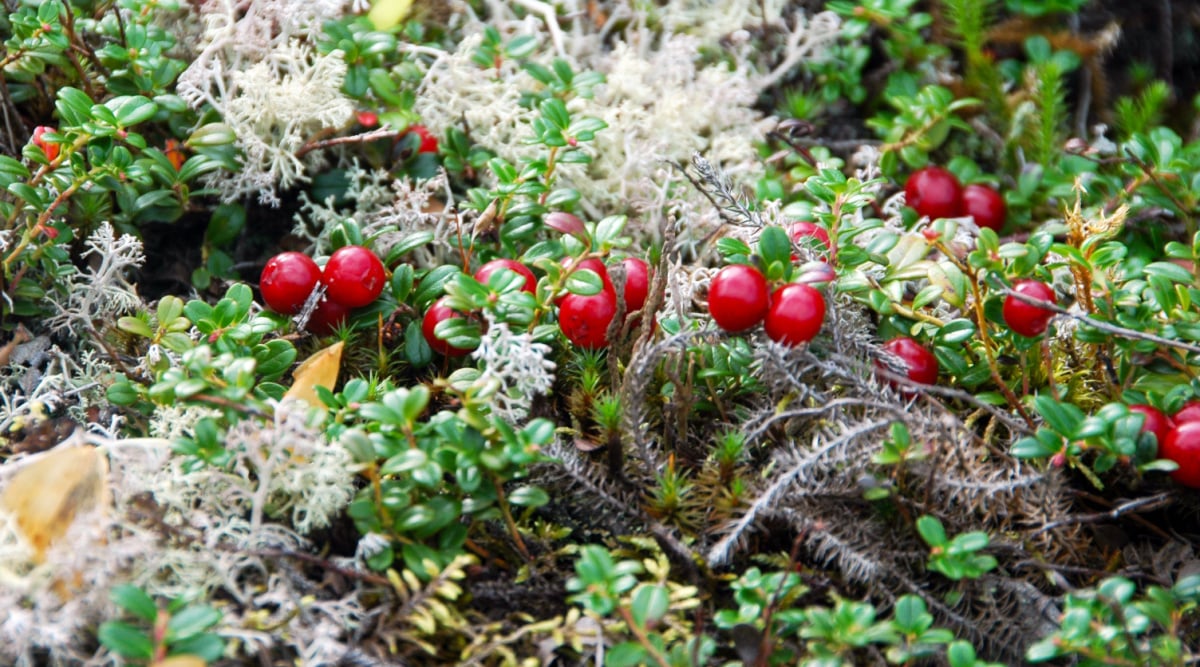

This ground-hugging decorative has eye-catching pink berries beloved by birds and small mammals. It’s an unbelievable alternative when you’d like a wildlife-friendly flooring cowl in your shade yard.
Partridge Berry is native to Jap North America. It likes acidic soil and is a superb underplanting for acid-loving vegetation like blueberries and rhododendrons.
Cute and dainty, this hard-working flooring cowl blooms with aromatic, trumpet-shaped blush to white blossoms from spring by fall. It’s often unbothered by pests and diseases.
Brass Buttons
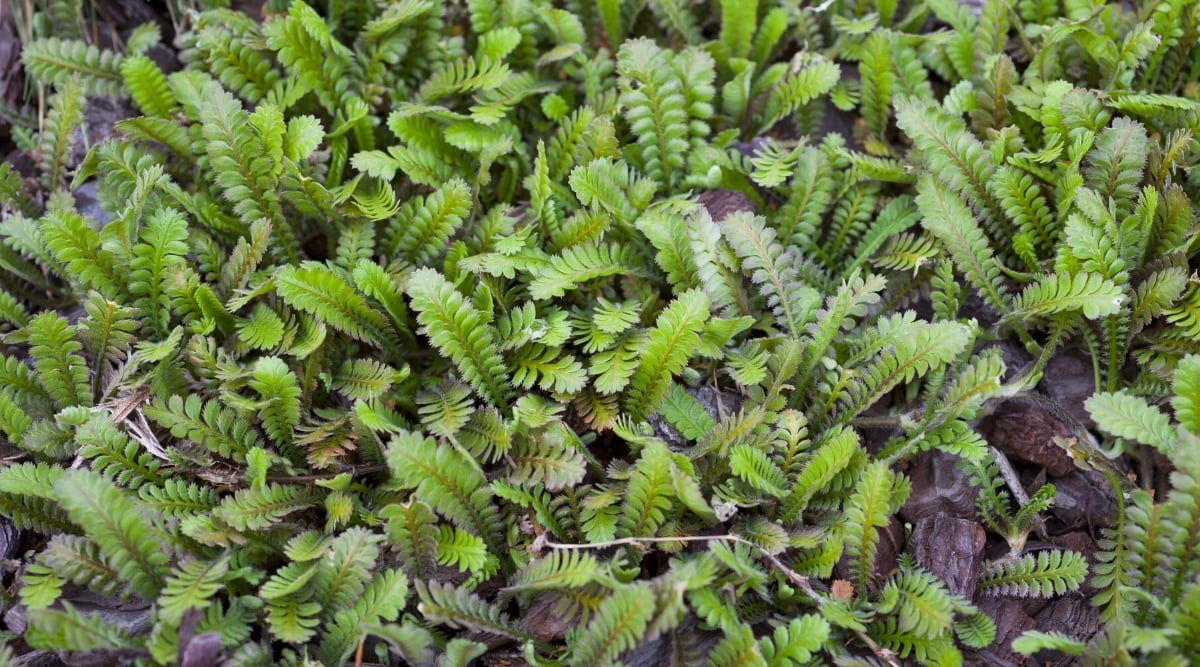

This funky, fern-like perennial is sweet for gardeners with a wide range of new house to fill with quite a few soil circumstances. When grown all through the shade, fewer of its yellow flowers will bloom, nonetheless the purplish inexperienced foliage is completely pretty with out them. ‘Platt’s Black’ is a cool likelihood with distinctive darkish purple leaves with inexperienced concepts.
Brass buttons unfold shortly and may be utilized as a yard fully completely different as they may deal with some foot web page company and require little upkeep. There aren’t many pests or illness factors, nonetheless be careful for aphids all through the spring.
Maintain the soil pretty moist, nonetheless don’t overwater to keep away from root rot. Brass buttons like pretty acidic soil. An excessive amount of picture voltaic scorches the leaves, making it an unbelievable likelihood for shady areas. Try lining pathways with it or permitting it to unfold between stepping stones and rock partitions.
Inexperienced and Gold
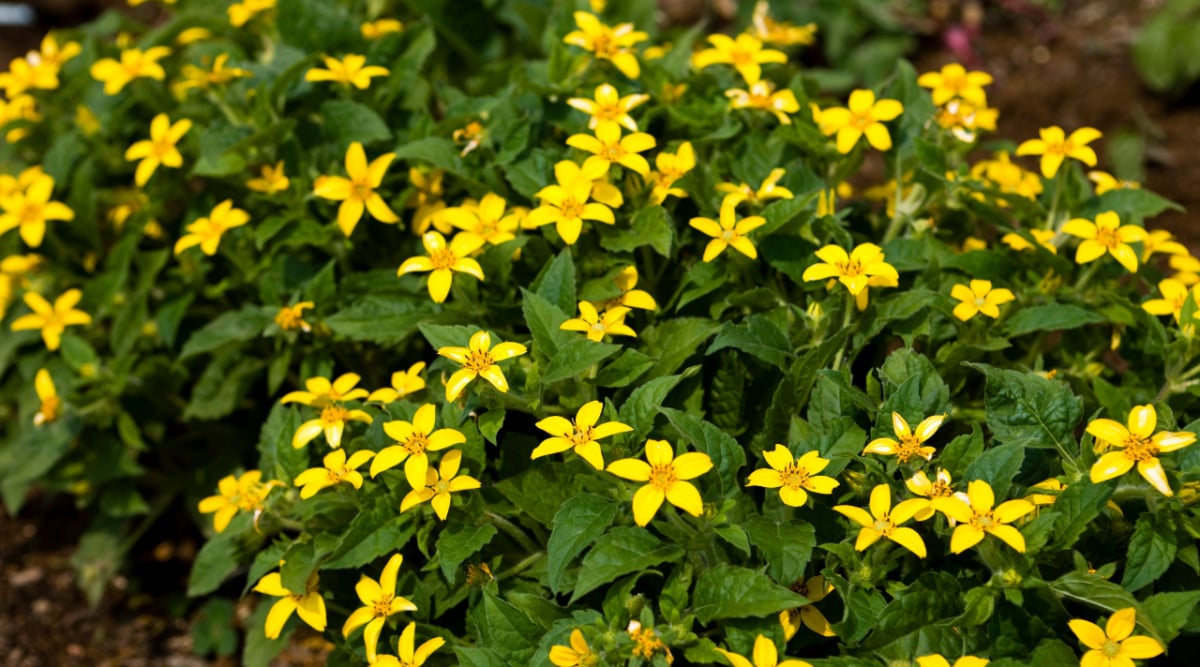

This stunning flooring cowl, furthermore often known as “the golden star plant” is native to the jap United States. It’s an unbelievable fully completely different to invasive Pachysandra.
Inexperienced and Gold is low upkeep. It kinds a low-growing mat of deep inexperienced leaves. In early spring, it blooms with vivid yellow, daisy-like flowers. A vigorous grower, it’d in all probability unfold quickly to fill in your shady yard areas.
This flooring cowl prefers persistently moist (nonetheless not soggy) soil. Inexperienced and Gold is simple to transplant and likewise seems to be good in pots and containers. It’s occasionally bothered by pests or illness, nonetheless sit up for uncommon slug and snail hurt.
Heartleaf Brunnera
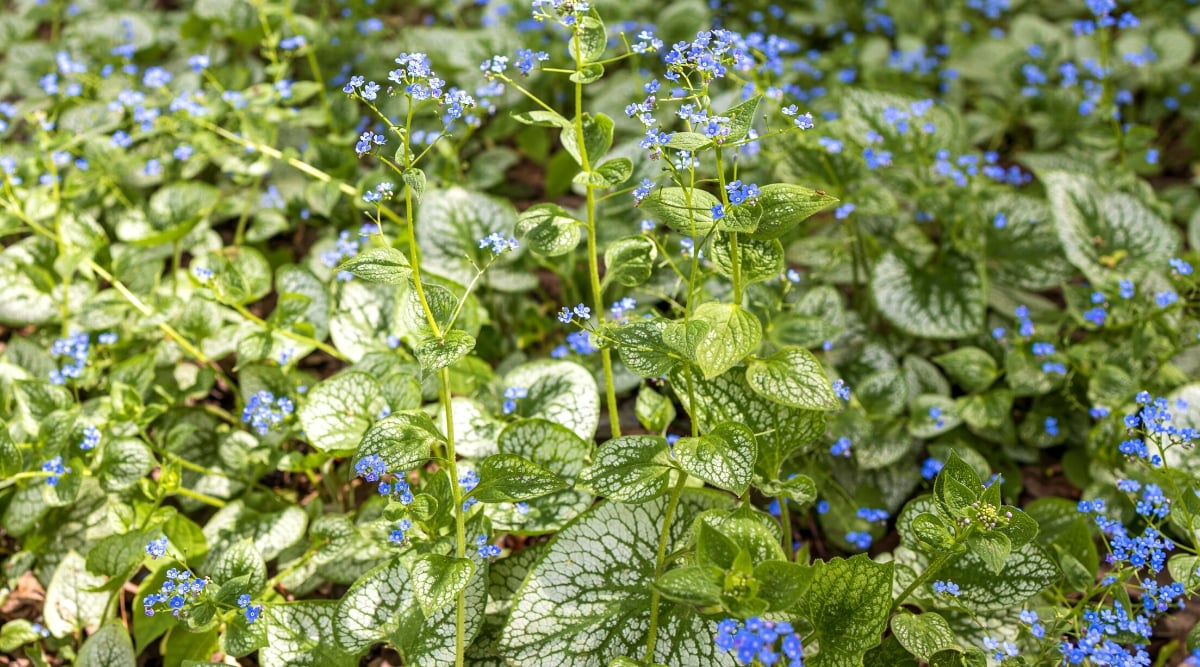

Generally often known as false forget-me-nots ensuing from their flower resemblance, Heartleaf Brunnera selections tiny blueish-purple flowers all through the spring alongside broad, heart-shaped, nearly iridescent leaves. The hairs on the leaves of this woodland plant make them unattractive to deer and rabbits.
This magnificence thrives all through the shade, spreads slowly underground, and is simple to maintain, making heartleaf brunnera a fan favourite. Some cultivars’ colours will almost certainly be barely subdued when grown all through the shade nonetheless attractive nonetheless. This flower gained’t carry out most fascinating in extended scorching, humid situations, though some silver-leafed varieties like “Sterling Silver’ tolerate it merely tremendous when afternoon shade is supplied.
Deadhead this magnificence all by means of the season to maintain enchancment healthful, eradicating any yellowing leaves or passed-by flowers. Brunnera could self-seed, nonetheless undesirable seedlings are straightforward to tug up.
Ultimate Ideas
I hope you found a shade-loving plant that matches your wishes. Or presumably you rediscovered a plant you haven’t grown shortly. Blissful flooring defending!
